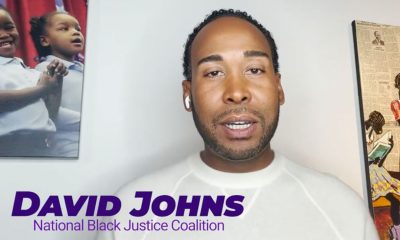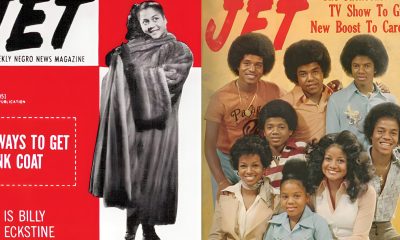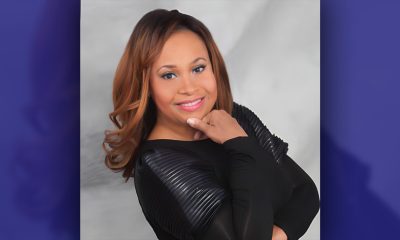Business
Poor Communities Lose Billions to Predatory Lenders
By Freddie Allen
NNPA Senior Washington Correspondent
WASHINGTON (NNPA) – Predatory lenders continue to target poor, Black and Latino communities, siphoning off $103 billion in fees and interests every year, and the rest of us are paying for it, according to a recent report by United for a Fair Economy.
“This is more money lost in poor communities than the United States spends on domestic food aid annually,” the report said. “We as a society end up subsidizing that lost income (an average of $3,029 per affected household) through a social safety net that is already underfunded and overcapacity.”
In “State of the Dream 2015: Underbanked and Overcharged,” United for a Fair Economy (UFE), an independent research group that advocates for economic equality across race, gender and class lines, chronicled the disparities that continue to plague the banking industry.
Mike Leyba, the communications director at UFE and co-author of the report said that systemic economic exclusion, largely based on race, has existed for hundreds of years in the United States.
The free labor of kidnapped and enslaved Africans enabled White male land owners and the financial institutions that supported them to accumulate massive amounts of wealth over hundreds of years.
Following the Civil War, Jim Crow laws and “The Black Codes,” continued to deprive freed African slaves of economic opportunities for decades.
After World War II, the GI Bill provided White male veterans a pathway to college, professional careers and a boost into the middle class, a bridge that was closed to Black veterans who also fought and spilled blood overseas. Later, the Federal Housing Administration blocked Black families from moving into suburban neighborhoods, built with and partially funded by government subsidies.
“More than a quarter of all White families shifted from renting to owning in the twenty years following WWII,” stated the report. “Despite laws to the contrary, Black people were excluded from buying homes in White neighborhoods and were forced instead to live in urban ghettos.”
According to the UFE report, less than 1 percent of all mortgages from 1930 to 1960 were issued to Black people.
By 2013, the median wealth held by White families ($141,900), dwarfed the median wealth ($11,000) of Black families.
“As an estimated 80 percent of assets come from transfers from prior generations, the history of the financial situations of prior generations is a primary cause of the racial wealth gap,” stated the report.
Leyba said that economic exclusion, largely based on race still exists, but it’s much harder to pinpoint.
“It may not be legalized or sanctioned by the federal government,” said Leyba. “But it still exists.”
Economic exclusion continues to plague the banking sector, leaving 93 million Americans “unbanked” or “underbanked.”
“The unbanked are people that do not have any type of consumer checking account, and are outside the entire banking system,” the report explained. “The underbanked are people that have a checking account, but also rely on Alternate Financial Service Providers.”
According to the report more than 20 percent (20.5 percent) of Black households were unbanked in 2013, compared to 3.6 percent of White households.
Forty percent of Black households were full-banked compared to 75.4 percent of White households.
Alternate Financial Service Providers or AFSPs include payday loans, auto title loans, rent-to-own shops, subprime credit cards, high-interest rate installment loans, check cashing, prepaid reloadable debit cards, and money orders, the report said.
Researchers found that people shun traditional banks in favor of AFSPs for a number of reasons. Fifty-eight percent said that they didn’t have enough money to meet minimum balance requirements to keep an account open, while others (17 percent) said that past credit problems made it difficult for them to open new accounts.
In recent years, following the housing crisis banks, Chevy Chase Bank, Wells Fargo and Bank of America paid out multi-million dollar settlements in mortgage lending discrimination lawsuits involving Black and Latino borrowers.
But even if Black customers were able to meet the minimum requirements, had good credit and confidence in banks, the contraction and consolidation in the financial sector following the Great Recession have placed traditional banks out of reach for millions of Americans.
AFSPs moved in to fill that void.
“Payday lenders are nearly eight times as concentrated in neighborhoods with the largest shares of Blacks and Latinos compared to White neighborhoods, draining nearly $247 million in fees per year from these communities,” the report said. “Even after controlling for income and a variety of other factors, payday lenders are 2.4 times more concentrated in Black and Latino communities.”
As local bank branches fade away, Leyba said, community businesses dry up.
“What we’re seeing with more large corporate banks taking over those local branches, it makes it so that there is very little incentive for them to invest in that local area,” explained Leyba. Especially, when the large corporate banks can get a much higher yield from other financial products, he added.
UFE researchers suggested that the United States follow other industrialized nations such as France, Germany, Japan, China, Brazil, India, and New Zealand by offering more banking services through local post offices, which have a much larger foothold in urban and rural communities than banks.
The report said that nearly 40 percent of post offices are in zip codes “without a single bank,” and about 20 percent are in zip codes with just one bank.
“In addition to handling money orders, transfers, and debit cards, postal window clerks have experience cashing checks, processing refunds, renting post office boxes, preparing bank deposits, and maintaining business accounts,” the report said.
The report also recommended reforming the Community Reinvestment Act (CRA), modernizing payment technology to keep pace with the new realities of banking and adopting national standards to cap the interest rates on payday loans.
Leyba said that lending circles that provide small community-based loans, have also been successful in emerging markets.
“We know that not everyone will find their way into the banking system, as there is no way to make that happen either through policy solutions or innovations in products,” stated the report. “What policy makers and advocates can do, though, is look for ways to attract, retain and encourage people to begin to build assets, build a favorable credit history and ultimately begin down the path of wealth creation.”
###
Activism
Oakland Post: Week of April 24 – 30, 2024
The printed Weekly Edition of the Oakland Post: Week of April 24 – 30, 2024

To enlarge your view of this issue, use the slider, magnifying glass icon or full page icon in the lower right corner of the browser window. ![]()
Bay Area
State Controller Malia Cohen Keynote Speaker at S.F. Wealth Conference
California State Controller Malia Cohen delivered the keynote speech to over 50 business women at the Black Wealth Brunch held on March 28 at the War Memorial and Performing Arts Center at 301 Van Ness Ave. in San Francisco. The Enterprising Women Networking SF Chapter of the American Business Women’s Association (ABWA) hosted the Green Room event to launch its platform designed to close the racial wealth gap in Black and Brown communities.

By Carla Thomas
California State Controller Malia Cohen delivered the keynote speech to over 50 business women at the Black Wealth Brunch held on March 28 at the War Memorial and Performing Arts Center at 301 Van Ness Ave. in San Francisco.
The Enterprising Women Networking SF Chapter of the American Business Women’s Association (ABWA) hosted the Green Room event to launch its platform designed to close the racial wealth gap in Black and Brown communities.
“Our goal is to educate Black and Brown families in the masses about financial wellness, wealth building, and how to protect and preserve wealth,” said ABWA San Francisco Chapter President LaRonda Smith.
ABWA’s mission is to bring together businesswomen of diverse occupations and provide opportunities for them to help themselves and others grow personally and professionally through leadership, education, networking support, and national recognition.
“This day is about recognizing influential women, hearing from an accomplished woman as our keynote speaker and allowing women to come together as powerful people,” said ABWA SF Chapter Vice President Velma Landers.
More than 60 attendees dined on the culinary delights of Chef Sharon Lee of The Spot catering, which included a full soul food brunch of skewered shrimp, chicken, blackened salmon, and mac and cheese.
Cohen discussed the many economic disparities women and people of color face. From pay equity to financial literacy, Cohen shared not only statistics, but was excited about a new solution in motion which entailed partnering with Californians for Financial Education.
“I want everyone to reach their full potential,” she said. “Just a few weeks ago in Sacramento, I partnered with an organization, Californians for Financial Education.
“We gathered 990 signatures and submitted it to the [California] Secretary of State to get an initiative on the ballot that guarantees personal finance courses for every public school kid in the state of California.
“Every California student deserves an equal opportunity to learn about filing taxes, interest rates, budgets, and understanding the impact of credit scores. The way we begin to do that is to teach it,” Cohen said.
By equipping students with information, Cohen hopes to close the financial wealth gap, and give everyone an opportunity to reach their full financial potential. “They have to first be equipped with the information and education is the key. Then all we need are opportunities to step into spaces and places of power.”
Cohen went on to share that in her own upbringing, she was not guided on financial principles that could jump start her finances. “Communities of color don’t have the same information and I don’t know about you, but I did not grow up listening to my parents discussing their assets, their investments, and diversifying their portfolio. This is the kind of nomenclature and language we are trying to introduce to our future generations so we can pivot from a life of poverty so we can pivot away and never return to poverty.”
Cohen urged audience members to pass the initiative on the November 2024 ballot.
“When we come together as women, uplift women, and support women, we all win. By networking and learning together, we can continue to build generational wealth,” said Landers. “Passing a powerful initiative will ensure the next generation of California students will be empowered to make more informed financial decisions, decisions that will last them a lifetime.”
Business
Black Business Summit Focuses on Equity, Access and Data
The California African American Chamber of Commerce hosted its second annual “State of the California African American Economy Summit,” with the aim of bolstering Black economic influence through education and fellowship. Held Jan. 24 to Jan. 25 at the Westin Los Angeles Airport Hotel, the convention brought together some of the most influential Black business leaders, policy makers and economic thinkers in the state. The discussions focused on a wide range of economic topics pertinent to California’s African American business community, including policy, government contracts, and equity, and more.

By Solomon O. Smith, California Black Media
The California African American Chamber of Commerce hosted its second annual “State of the California African American Economy Summit,” with the aim of bolstering Black economic influence through education and fellowship.
Held Jan. 24 to Jan. 25 at the Westin Los Angeles Airport Hotel, the convention brought together some of the most influential Black business leaders, policy makers and economic thinkers in the state. The discussions focused on a wide range of economic topics pertinent to California’s African American business community, including policy, government contracts, and equity, and more.
Toks Omishakin, Secretary of the California State Transportation Agency (CALSTA) was a guest at the event. He told attendees about his department’s efforts to increase access for Black business owners.
“One thing I’m taking away from this for sure is we’re going to have to do a better job of connecting through your chambers of all these opportunities of billions of dollars that are coming down the pike. I’m honestly disappointed that people don’t know, so we’ll do better,” said Omishakin.
Lueathel Seawood, the president of the African American Chamber of Commerce of San Joaquin County, expressed frustration with obtaining federal contracts for small businesses, and completing the process. She observed that once a small business was certified as DBE, a Disadvantaged Business Enterprises, there was little help getting to the next step.
Omishakin admitted there is more work to be done to help them complete the process and include them in upcoming projects. However, the high-speed rail system expansion by the California High-Speed Rail Authority has set a goal of 30% participation from small businesses — only 10 percent is set aside for DBE.
The importance of Diversity, Equity and Inclusion (DEI) in economics was reinforced during the “State of the California Economy” talk led by author and economist Julianne Malveaux, and Anthony Asadullah Samad, Executive Director of the Mervyn Dymally African American Political and Economic Institute (MDAAPEI) at California State University, Dominguez Hills.
Assaults on DEI disproportionately affect women of color and Black women, according to Malveaux. When asked what role the loss of DEI might serve in economics, she suggested a more sinister purpose.
“The genesis of all this is anti-blackness. So, your question about how this fits into the economy is economic exclusion, that essentially has been promoted as public policy,” said Malveaux.
The most anticipated speaker at the event was Janice Bryant Howroyd known affectionately to her peers as “JBH.” She is one of the first Black women to run and own a multi-billion-dollar company. Her company ActOne Group, is one of the largest, and most recognized, hiring, staffing and human resources firms in the world. She is the author of “Acting Up” and has a profile on Forbes.
Chairman of the board of directors of the California African American Chamber of Commerce, Timothy Alan Simon, a lawyer and the first Black Appointments Secretary in the Office of the Governor of California, moderated. They discussed the state of Black entrepreneurship in the country and Howroyd gave advice to other business owners.
“We look to inspire and educate,” said Howroyd. “Inspiration is great but when I’ve got people’s attention, I want to teach them something.”
-

 Activism4 weeks ago
Activism4 weeks agoOakland Post: Week of March 27 – April 2, 2024
-

 #NNPA BlackPress4 weeks ago
#NNPA BlackPress4 weeks agoCOMMENTARY: D.C. Crime Bill Fails to Address Root Causes of Violence and Incarceration
-

 #NNPA BlackPress4 weeks ago
#NNPA BlackPress4 weeks agoMayor, City Council President React to May 31 Closing of Birmingham-Southern College
-

 #NNPA BlackPress4 weeks ago
#NNPA BlackPress4 weeks agoBeloved Actor and Activist Louis Cameron Gossett Jr. Dies at 87
-

 Community1 week ago
Community1 week agoFinancial Assistance Bill for Descendants of Enslaved Persons to Help Them Purchase, Own, or Maintain a Home
-

 Activism3 weeks ago
Activism3 weeks agoOakland Post: Week of April 3 – 6, 2024
-

 Business1 week ago
Business1 week agoV.P. Kamala Harris: Americans With Criminal Records Will Soon Be Eligible for SBA Loans
-

 Activism2 weeks ago
Activism2 weeks agoOakland Post: Week of April 10 – 16, 2024
























































